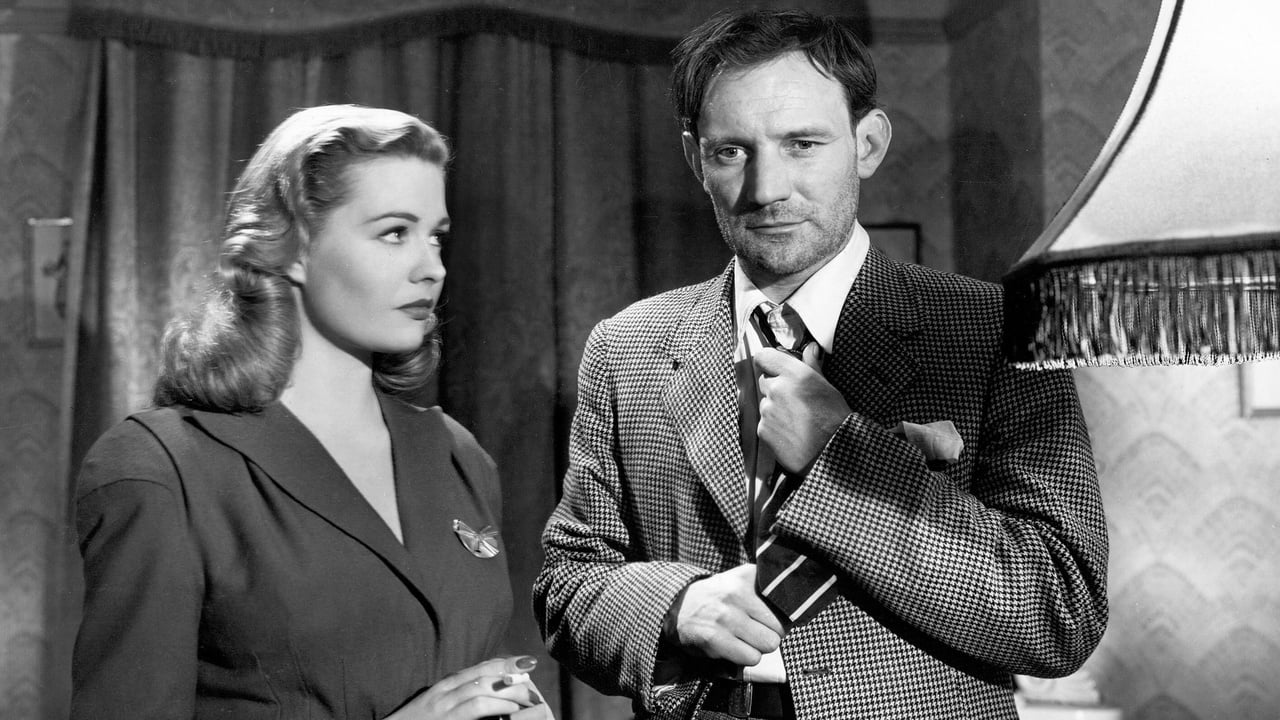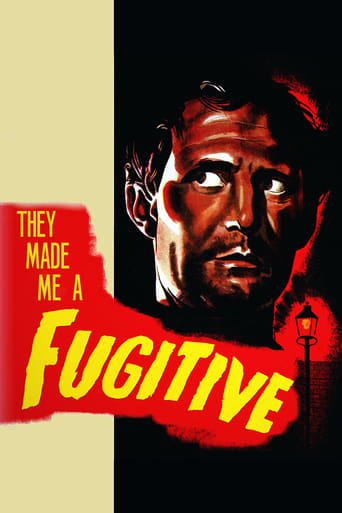ManiakJiggy
This is How Movies Should Be Made
ReaderKenka
Let's be realistic.
Steineded
How sad is this?
Twilightfa
Watch something else. There are very few redeeming qualities to this film.
secondtake
They Made Me a Fugitive (1947)This is a vigorous British crime noir film, a counterpart to the great Warner Bros American movies from the same period (and earlier) and to American post-war film noir. (In fact, this was released by Warner Bros.) The plot is fast and twisty and the photography is bold and dramatic with a lot of night scenes. Great stuff. If you like this sort of thing normally you'll love this.The star is one of the Howard Brothers, Trevor, playing a would-be criminal and eventually the fugitive of the title. He's mixed up with some tough criminal types (British style) and some female leads that have echoes of film noir femme fatales. There is violence, angular camera-work, even a few special effects, and a couple of sympathetic leads who eventually take the plot somewhere new.Howard's biggest role, in the best movie of his career, came two years earlier in "Brief Encounter," and he's again complex and nuanced and someone to identify with. But he's not especially sympathetic, playing a hardened, selfish type who just happens to have a conscience unlike his cohorts. The movie follows him through several phases of his brush with crime, and with an attempt to clear his name. There is a rather long and dramatic and somewhat unconvincing fight scene near the end (the throw of the milk bottle takes first prize in this one), but the very last scene is brutally pessimistic in a way American noirs are oddly not.If you like film noir this is a must see. If you appreciate a good movie for its action and drama, likewise. There may be no deep character development are larger social arc here, but that's true of a lot of American noirs, too. So just jump and and soak it all up.
Robert J. Maxwell
I don't know where the comparisons to "The Third Man" come from. This movie and Carol Reed's masterpiece have little in common except the use of smuggling as a crime. This movie is a little slow at first but engages the viewer after the first ten minutes or so. Nothing much more than that.A diverting post-war tale of a gang of British criminals led by Narcy. Something to do with smuggling and robberies. Returned and demobilized RAF hero Trevor Howard joins them out of desperation. Narcy doesn't like "amateurs" and frames Howard for a murder. Howard escapes and, aided by another "amateur", the pouty and sensual blond, Sally Grey, he spends the rest of his time trying to track the gang members down and get them to spill the beans about his innocence. They, in turn, are anxious for him to be silenced. There is a climactic brawl between Howard and the gang members in the Valhalla Casket Company. The wind up is that Narcy falls off a roof and is killed without confessing to Howard's innocence. Howard is sent off to jail again and Grey shouts that she'll wait for him.Man, these settings are seedy and so are the people. They're cynical, greedy, totally lacking in compassion. The dialog is -- I hope -- intentionally and amusingly overblown. Cop to Narcy, referring to Narcy's bodyguard: "I see you brought Frankenstein along." Narcy: "He's working his way through college." And, later, Narcy to a sobbing young woman: "Shut your trap. There's a draft." And Howard's refrain: "I believe you; thousands wouldn't." And then there are the names, Soapy, Aggie, Curly, Fidgety Phil. It's as if the writer and director were doing a semi-serious parody of American films noir, except that when this was shot there were no such things as films noir. They may have had the earlier gangster movies in mind -- "Little Caesar" and the like -- or it may have been a case of independent invention.I will now point out two differences between "I Became a Fugitive" and American crime dramas of the period. One -- and I find this morally offensive -- is that the British movie makes use of the word "damn" -- twice. It made my hackles rise. How would the Brits have felt if we upright, God-fearing, Americans had thrown "bloody" about in a recklessly adjectival manner, eh? "Bloody" -- now there's a silly taboo word if I ever heard one. And don't even get me started on "bum" and "bottom" and "Bristol." Here's another difference. In this dark British crime drama, hardly anybody has a gun! When the gang is together, planning to murder Howard, Narcy has to ask who's carrying a piece. You, Curly? "Nah, I always use me toothpick." (Switchblade knife.) Finally Narcy manages to locate a gun -- not even a snub-nosed .38 -- and hands it to one of the gang who, get this, refuses to promise he'll use it. The gun is fired during the climactic fight, but only once deliberately, and it misses. When Howard is holding the loaded automatic and the knife wielder is charging him, Howard flings the pistol at his assailant and it bounces from his forehead. In a good, old-fashioned, honest American movie, that climactic fight would end up with a warehouse awash in blood, with Uzis puncturing every puncturable object within miles, with dead bodies hanging from meat hooks, eyeballs rolling around on the floor like marbles.I'm kidding about all that, but what really was something of a surprise at the end was when Scotland Yard carts Howard off to the slams and he's saying good-bye to the dewy eyed blond who loves him. Since no one has admitted that Howard was framed, he's off to serve out his original sentence -- and more. The Inspector gives only a hint that he might escape this punishment. It was surprising because, after all, Howard has killed no one, is guilty of nothing more than small-time smuggling, and has been willingly instrumental in helping the police capture the gang. On top of that, he's presumably willing to testify against them in court, which will close a few open cases. It's believable but a touch grim.The director handles everything pretty deftly but has a tendency to have the actor stare directly into the camera when making a pronouncement. And these aren't point-of-view shots. They're just people speaking to a lens. Howard is good, Gray is bland, and Griffith Jones, who plays Narcy, is reduced to a stereotype with his gangsta talk. He always sneers, orders helpless women to be beaten with heavy belts, never says thanks, and shows no affection or unusual habits. He has no redeeming features and no interesting ones either. I don't think he was meant to play the role clownishly but that's how it comes across.It isn't badly done but it's unjust to compare it to "The Third Man" or even noirs like "Cry of the City."
yourstruly2010
utterly fantastic gangster film from the UK, relentlessly dark and sarcastic cynical and violent with a morose sense of humour doomed pilot returns from the war to become a gangster job goes wrong is framed for murder escapes from jail to clear his name but before he gets back to the city hes framed for another murder so may as well get busy and exact some revenge while hes at it.there was a slew of these British gangster films at the time as was a reflection of what was happening in British society the gangsters much like their American counterparts made small fortunes from illegal gambling activities and selling elicit goods (in england postwar rationing meant a clamouring black market for everything from food to alchaol and strikingly this film even portrays drug dealing) not as well known as the American gangster movies but similar other films of note in the genre (known in the UK as the Spiv Cycle) are Brighton Rock, Black Memory, The Dark Road, Dancing With Crime, Appointment With Crime, Silent Dust, No Tres in the Street.
MartinHafer
This is a very gritty British example of film noir. Unlike its American counterpart, this film was filled with cursing--something you could not get away with in Hollywood. Otherwise, in many ways the film was much like an American version--nice camera angles, tough dialog and lots of not particularly handsome actors! The film begins with Trevor Howard looking for work with some mobsters. While he's keen on the idea of making some illegal money, he has some moral scruples. So, when they try to get him to deal with drugs, he refuses--and incurs the wrath of the gang leader. To pay him back, the leader arranges for Howard to be blamed for running over a cop! As a result, Howard is sent to jail to serve a 15 year sentence. However, he soon breaks out and swears revenge on the gang.Overall, the film gets high marks for realism and excitement. The end was not perfect (too many times the baddies were able to just knock the gun out of the hands of the good guys and vice-versa--I would have simply plugged them the second I got my hands on the gun!), but was still very satisfying. I particularly liked the violent ending as well as how Howard's exoneration was handled--it came as a bit of a surprise--and I like to be surprised. Good acting and direction make this one a winner.By the way, although I liked this film, there was a weird, flat performance from the wife who sheltered Howard after he escaped. While her character was exceptionally interesting, up until the final moments with her she seemed almost like she was in zombie mode! I am not sure what she and the director were trying to achieve here.

